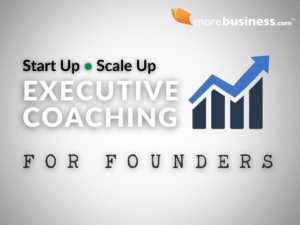Business coaching vs executive coaching – which is right for you? And which one will help you grow as a business and as a leader?
For ongoing professional growth, the choice between business coaching and executive coaching is a key decision as you look to reach new heights in your career. My journey from founding multiple B2B SaaS startups to executive roles in venture-backed companies has taught me that the type of coaching you need depends on where you’re at in your own journey.
Table of Contents
Business Coaching vs Executive Coaching
Choosing the right coaching path is pretty important for your professional growth. Between business coaching and executive coaching, there’s a lot to consider. My own path from startup CEO to the C-suite in an established company has shown me how each type of coaching can uniquely benefit your career. I’ll share the differences to help you find the perfect fit for your aspirations.
Business coaching and executive coaching serve distinct purposes, yet both aim to elevate your career to new heights. While one focuses on the intricacies of running and expanding a business, the other hones in on personal leadership skills within a corporate setting. Understanding these nuances plays a role in your professional development.
Deciding which coaching is right for you shouldn’t be a quick choice. It requires a deep understanding of where you are in your career and where you want to go. Let’s walk through each option so you make an informed decision tailored to your unique journey.
10 Coaching Topics With Session Plans →
Business Coaching Fundamentals
 Business coaching is a lifeline for those looking to start or grow their own business. It’s similar to an advisor who you bring on to help you with specific growth tactics, such as turning strategic visions into reality, mastering marketing and sales, and managing operations and finances.
Business coaching is a lifeline for those looking to start or grow their own business. It’s similar to an advisor who you bring on to help you with specific growth tactics, such as turning strategic visions into reality, mastering marketing and sales, and managing operations and finances.
This coaching type empowers you with practical, actionable advice to navigate the business world’s challenges and capitalize on its opportunities.
The focus is more on your company rather than on you as an individual leader. In business coaching, unlike executive coaching, you’ll learn how to dissect problems, identify opportunities, and execute strategies that lead to sustainable growth. It’s tailored for the ambitious entrepreneur eager to push their business beyond its current boundaries.
Through business coaching, you’ll gain insights into creating effective business models, understanding market dynamics, and developing a competitive edge. It is more tactical than executive coaching.
Entrepreneurship is filled with uncertainties. Business coaching provides a roadmap, equipping you with the knowledge and skills to make informed decisions. Whether it’s optimizing operations, enhancing customer engagement, or scaling your business, a business coach can guide you through each step to achieve long-term success.
Sample Business Coaching Conversations
Business coaching vs executive coaching focuses on different areas of development. Here are a few examples of common business coaching topics:
1. Strategic Planning and Company Vision
You’ll get into creating a robust strategic plan that aligns with your long-term vision for the company. This includes setting clear, achievable goals and identifying the steps necessary to reach them. Understanding market trends, competitor analysis, and internal capabilities will be crucial. This comprehensive approach ensures that your strategic initiatives are well-informed and focused on driving sustainable growth.
 2. Marketing Strategies and Brand Development
2. Marketing Strategies and Brand Development
In this area, you’ll explore innovative marketing strategies and brand development techniques tailored to your target audience. This includes digital marketing, content creation, and brand positioning to create a strong, recognizable brand. You’ll learn how to effectively communicate your brand’s value proposition and engage with your customers on multiple platforms, driving brand loyalty and growth.
3. Financial Management and Fundraising
You’ll gain insights into financial planning, budget management, and fundraising strategies essential for maintaining and scaling your business. This covers everything from cash flow management to exploring various funding options such as venture capital, loans, and crowdfunding. The goal is to equip you with the financial acumen necessary to make informed decisions that ensure your business’s financial health and viability.
4. Leadership Skills and Team Development
This topic can overlap with executive coaching. It focuses on developing your leadership style and skills to build and nurture a high-performing team. You’ll learn about effective communication, delegation, and conflict resolution techniques that foster a positive and productive work environment. This also includes strategies for talent development and creating a culture that attracts, retains, and motivates top talent.
5. Operational Efficiency and Process Improvement
Here, you’ll discover ways to enhance operational efficiency through process optimization, technology integration, and workflow management. By identifying bottlenecks and implementing best practices, you’ll be able to streamline operations, improve service delivery, and reduce costs. This focus on efficiency not only improves your bottom line but also enhances your ability to adapt and respond to market changes swiftly.
Each of these topics provides a foundation for business coaching conversations aimed at equipping you with the knowledge, skills, and strategies to lead your business toward success and growth.
How Is Executive Coaching Different?
 Executive coaching on the other hand is more about personal growth within a leadership role. It focuses on enhancing your decision-making, emotional intelligence, and ability to inspire and lead teams. This type of coaching is designed to elevate your leadership to impact your organization positively.
Executive coaching on the other hand is more about personal growth within a leadership role. It focuses on enhancing your decision-making, emotional intelligence, and ability to inspire and lead teams. This type of coaching is designed to elevate your leadership to impact your organization positively.
Through executive coaching, you’ll get into the aspects of leadership that go beyond mere management. You’ll explore how to cultivate a strong executive presence, communicate effectively with stakeholders, and lead with empathy and integrity.
This personalized coaching approach helps you navigate complex dynamics of both people and organizations. The goal is to drive change that makes you a better leader.
Free: Executive Coaching Newsletter →
When you think about it, as a leader your influence extends well beyond business strategy. It shapes the company’s culture and values. Executive coaching enables you to understand and leverage this influence, guiding your team toward shared goals and visions. It’s about becoming the leader who not only envisions success but also inspires others to achieve it.
I had an executive coach for 15 years. I wish I had started sooner. My coaches turned on light switches in my head that I didn’t know existed. The breakthroughs in my limiting beliefs, my leadership style, and my ability to motivate my team resulted in more productivity and revenue. It also resulted in me being able to sell my companies in successful exits to public firms.
This experience is the primary reason I became an executive coach: to help others achieve their greatness.
Sample Executive Coaching Conversations
Here are examples of executive coaching topics that you and your coach might discuss:
1. Leadership and Influence
This area focuses on enhancing your ability to lead with authenticity and influence your team and stakeholders effectively. You’ll explore techniques to inspire trust, drive vision, and foster a culture of accountability. Developing these skills enables you to navigate organizational dynamics skillfully and spearhead initiatives that align with your company’s goals.
 2. Emotional Intelligence and Communication
2. Emotional Intelligence and Communication
Emotional intelligence is crucial for understanding and managing your emotions and those of others. In this executive coaching area, you’ll learn strategies to improve your emotional awareness, enhance your communication skills, and build stronger relationships within your team. This fosters a collaborative environment that encourages open dialogue and mutual respect.
3. Strategic Decision-Making
While both business coaching vs executive coaching may touch on strategy, here you will go deep into thought process of making well-informed decisions that benefit your organization in the long run. Business coaching will identify a specific topic and help solve it, whereas the executive coaching approach focuses on learning the skills to self-correct and reflect.
By evaluating different strategic frameworks and approaches, you’ll become adept at analyzing complex scenarios, anticipating potential outcomes, and choosing the best course of action. This is key to steering your organization through challenges and opportunities alike.
4. Change Management and Adaptability
Change is constant in the business world and adaptability is a critical leadership trait. This coaching topic equips you with the tools to lead change initiatives effectively, manage resistance, and ensure your team remains agile and responsive. Learning to navigate change with confidence prepares your organization to thrive in evolving markets.
5. Executive Presence and Personal Branding
Developing a strong executive presence and personal branding is about crafting and conveying your leadership identity. This area focuses on honing your ability to command respect, articulate your vision clearly, and represent your organization with integrity. A compelling executive presence enhances your credibility and influence, both within and outside your organization.
Each of these areas is tailored to equip executives with the insights, skills, and strategies necessary to excel in leadership roles and drive your organizations toward success.
Comparing Business and Executive Coaching
 While both coaching types aim to propel you forward, their approaches and focuses differ significantly. Business coaching is tactical and hands-on, ideal for those building and scaling businesses. It’s about the external factors that contribute to business success. On the other hand, executive coaching is introspective, focusing on the internal growth necessary for effective leadership within an organization.
While both coaching types aim to propel you forward, their approaches and focuses differ significantly. Business coaching is tactical and hands-on, ideal for those building and scaling businesses. It’s about the external factors that contribute to business success. On the other hand, executive coaching is introspective, focusing on the internal growth necessary for effective leadership within an organization.
Choosing between business and executive coaching depends on your current career stage and where you see yourself in the future. If you’re at the helm of a startup or small business seeking to understand market strategies and financial planning, business coaching is likely what you need.
That said, if you’re in a leadership position within a larger organization are looking to refine your leadership skills and drive organizational change, executive coaching would be the better choice.
Choosing Between Executive Coach vs Business Coach
Identifying the right coaching option that makes the most sense for you means honestly asking yourself about your blind spots. Recognize the challenges you face and the goals you aim to achieve. When searching for an executive coach vs business coach, take a look at their experience, background, and whether they’ve successfully navigated similar paths to the one you’re on.
The relationship between you and your coach is one based on mutual respect and trust. It’s important to find someone you resonate with, someone who understands your vision and challenges. The right coach is not just a mentor but a partner in your journey toward achieving your professional goals.
I can share from personal experience that you might outgrow a coach. For example, you might start with a business coach, who is akin to an advisor on how to grow your company. At some point, you may find the you need to develop more leadership skills and your current coach is no longer a fit. The exception is if you’re able to find a coach that can straddle both sides of coaching, business and executive leadership.
 Your Coaching Journey
Your Coaching Journey
The journey through business and executive coaching is unique to each individual. Reflecting on my experiences, I’ve seen the profound impact the right coaching can have on a career. This guide is designed to help you navigate your options, ensuring you choose the coaching path that best aligns with your personal and professional growth.
Take a moment to reflect on your career, your challenges, and where you want to go. Coaching could be the catalyst you need to achieve your goals. If you’re ready to take the next step, consider reaching out for a consultation to explore how coaching can transform your career.
Schedule a Coaching Consultation →
 Author: Raj Khera is an Executive Business Coach, a former 3x CEO, and publisher of MoreBusiness.com
Author: Raj Khera is an Executive Business Coach, a former 3x CEO, and publisher of MoreBusiness.com










